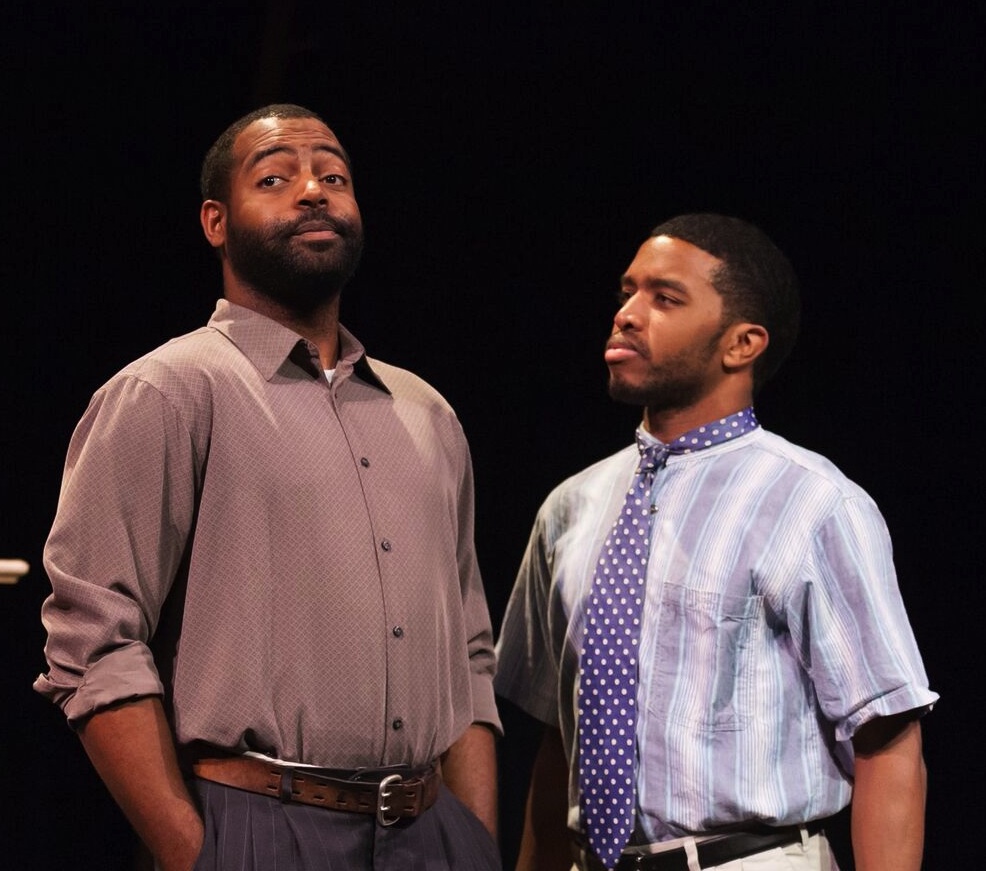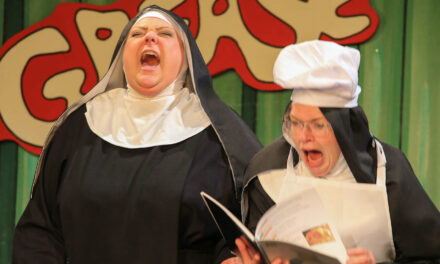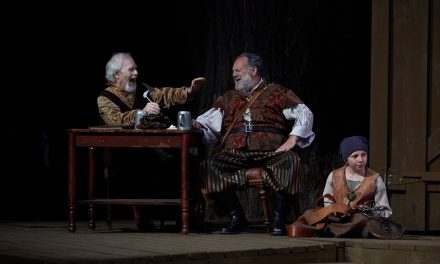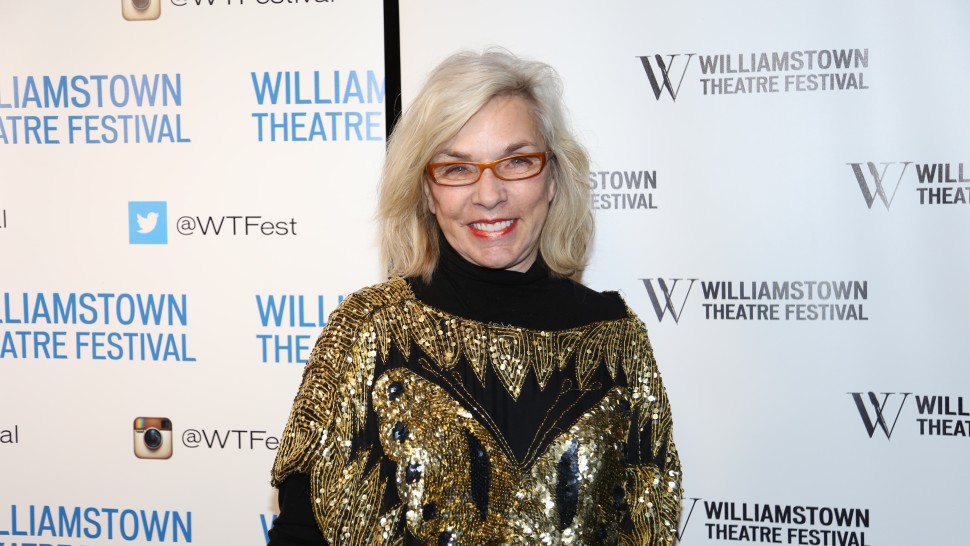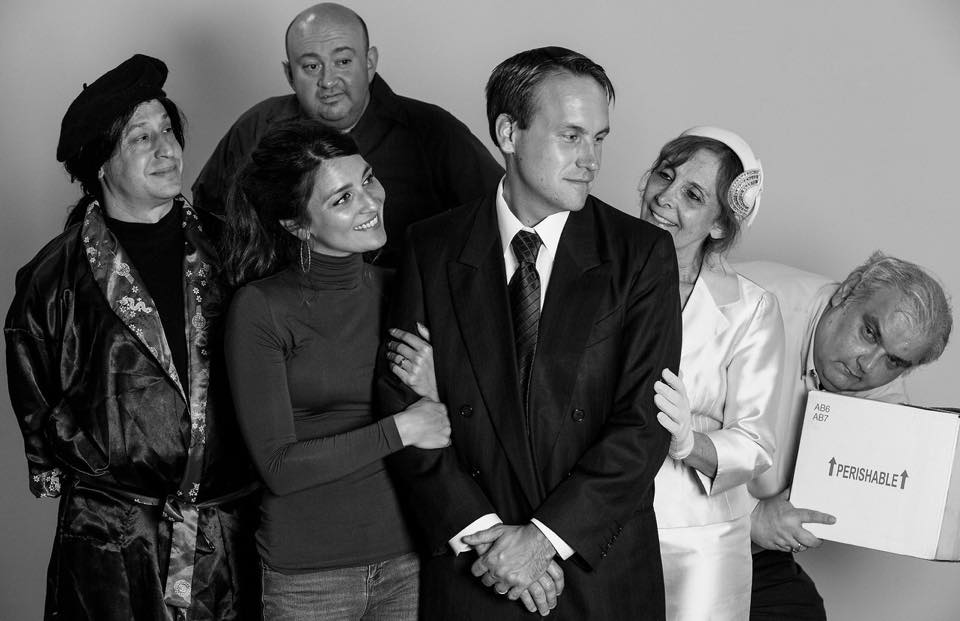River City
By Diana Grisanti
Directed by Amy Attaway
Review by Keith Waits
Entire contents copyright © 2016 by Keith Waits. All rights reserved.
Robert Thompson & Jared Giles in River City. Photo by Bill Brymer.
Diana Grisanti’s River City has been a long time coming, years in development and the winner of the Rolling World Premiere through the National New Play Network; it is both a tribute to and critical commentary on Grisanti’s home town of Louisville, Kentucky.
The narrative moves back and forth between two timelines. Mary (Angela D. Williams) and Javier (Lucas Adams), a young married couple in Chicago expecting their first child. But Mary is from Louisville, raised by her white mother in the east end suburbs, and when the play opens, she and Javier have just returned from her black father’s funeral in the River City. His death has raised troubling concerns for Mary, and she feels compelled to return to her hometown permanently, despite Javier’s objection that, due to his growing success as a chef and an opportunity to start his own restaurant in the Windy City, Chicago is their home.
In scenes beginning in 1968, we see her father, Edward (Jared Giles) as a 14-year-old boy, the only “Negro” in a Catholic orphanage in the Germantown neighborhood. He is mentored by Sister Alice (Rena Cherry Brown), a first-generation Italian immigrant who listens to horse races from Churchill Downs on her aging radio. In order to keep Edward from being transferred to another state, she sends him to get a job with Whitney Deely (Robert Thompson) at the radio repair shop owned by his father. Whitney gives Edward a job, but the relationship will take on greater meaning than either man would ever anticipate.
Grisanti is addressing a crucial aspect of Louisville’s identity, a racial divide symbolized by the long held joke about “crossing 9th Street,” that is nothing new to residents here. Yet, by creating a group of multi-racial characters that, for the most part, are positioned to deliberately contravene expected stereotypes, she is able to view these preconceptions with new eyes. Mary’s exploration into her family past is extremely personal, and the core of the play’s narrative momentum, and results in a beautifully understated but meaningful exchange in the final moments.
The divide is also what defines the familial relationships here, particularly as pertains to fathers. The distant patriarch is a classic theme, and one that is of no small significance in African American families in the last half century or more, and River City has something real and substantial to contribute to that body of literature.
But the production stumbles with uneasy interjections of broad humor that elicit laughs that cannot help but feel misbegotten and in conflict with the play’s true heart. Rena Cherry Brown’s Sister Mary is undoubtedly entertaining, and Ms. Brown has the timing to put the jokes across, even if her Italian accent comes on a little too thick at first, but the borscht belt delivery seems to rob her relationship with Edward of depth, so that her essential support of him seems a matter of plot expediency rather than emotional truth.
A similar effect arrives when Roger, an employee of the County Clerk’s office, visits Mary at her mother’s house to deliver documents concerning her father’s history. The improbability of County Clerk employee house calls is perhaps answered by the fact that Roger turns out to be, unbeknownst to Mary, a former classmate who had a huge crush on her. Again, Sisk is funny here, but the tone of the piece becomes very situation comedy in this scene, a quality that undermines the following interaction between Mary and Javier by interjecting a modicum of cheap melodrama. Fortunately that errant note isn’t given time to take root, but the abrupt tonal shift remains jarring.
Where the play is most successful is in the moments that delineate the key relationships between Mary and Javier, and Edward and Whitney. Mary’s struggle feels almost too genuine to take in at times, and as Angela D. William’s performance moves further and further into emotional angst, it can be a struggle to make sense of the character’s willingness to place her relationship with her seemingly ideal husband in turmoil. Lucas Adams makes Javier a stalwart and understanding figure that serves as something as a surrogate for the audience, and the strength of their scenes together, both in the writing and the playing, go a long way to overcoming the uneasiness.
Much of the audience’s understanding comes from the parallels with Edward and Whitney, and the revelations that originate in that timeline allow insight into the contemporary storyline in ways that may seem somewhat predictable, but more importantly, feel inevitable. Jared Giles is a brash and youthful Edward, and Robert Thompson grounds the play in very important ways as Whitney. He mostly underplays the role, bringing to the stage a forceful and magnetic presence that fully realizes Whitney’s meaning and most clearly establishes the period of Louisville history that includes the violence surrounding civil rights protests in 1968.
It is interesting that Grisanti expresses the lack of belief in the viability of the “west end” of Louisville through the mouths of African American characters. It puts the audience on its guard against easy assumptions and underscores that such ingrained cultural ignorance is not inherent to racial identity. The tonal shifts might distract but ultimately they do not detract from the essential observations of the story.
The design work was very good, albeit unflashy. Lights, sets, and costumes were functional and called little attention to themself, which seemed right for this material.
However long Ms. Grisanti has worked with this material. I left the theatre hoping she gets back into it. It does so much so well, forcing a new perspective on an important aspect of Louisville’s identity; one fashioned on a foundation of universality that I am willing to bet rings true for many other American cities.
River City
October 7, 8, 10, 14, 15 @ 8:00pm
October 9 @ 2:00pm
Tickets are $17 in advance and $22 at the door. For tickets and show times, check the Kentucky Center’s website.
Theatre [502]
Kentucky Center for the Performing Arts
501 West Main Street
Louisville, KY 40204
502-584-7777
kentuckycenter.org
theatre502.org
Keith Waits is a native of Louisville who works at Louisville Visual Art during the days, including being the host of PUBLIC on WXOX-FM 97.1/ ARTxFM.com, but spends most of his evenings indulging his taste for theatre, music and visual arts. His work has appeared in Pure Uncut Candy, TheatreLouisville, and Louisville Mojo. He is now Managing Editor for Arts-Louisville.com.

